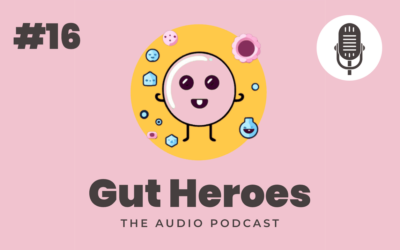You can listen to the audio version of this Roundup on the podcast
This is a Gut Roundup, where I look at the most interesting findings from recent weeks.
I talk about what they mean and how they might relate to our gut health – and more than just our gut health – everything from our general health to managing chronic disease.
Today, I want to look at three really interesting studies: intermittent fasting, the Western diet and its impact on chronic disease, and a really interesting topic called ‘smart’ antibiotics.
We’ll kick off with intermittent fasting because this is something I do myself and I’ve had extremely positive outcomes from it.
I’ve recommended it to lots of others too, and I would recommend looking at it, as long as you’re able to do it safely.
Please remember, this isn’t medical advice. I’m just sharing information from widely available studies and from my own personal experience. What’s discussed here won’t necessarily be right for everyone because we are all different.
Intermittent fasting versus continuous caloric restriction
This first study we’re going to look at was published in Nature very recently and it’s got a very catchy name: “Gut microbiome remodelling and metabolomic profile improves in response to protein pacing with intermittent fasting versus continuous caloric restriction”.
You can see the full study here.
They’re examining the changes in our weight and in the composition of the microbiome – that world that lives within your gut – in response to two different protocols.
The first one being simply reducing your calorie intake.
The second one being intermittent fasting with that calorie intake.
It looks at these two different low calorie diets.
It then measured various health markers in people who are overweight or obese.
This study was done over eight weeks.
It had 41 participants, a relatively small study, all of whom were either overweight or obese.
They were then randomly assigned either an intermittent fasting with protein pacing diet or a continuous calorie restriction diet matched for overall calorie intake.
In essence they were doing the same lowering of calories in both diets, but with one of them, it was spread evenly over time, and in the other one, there were periods of fasting.
Typically the participants who were doing the fasting had around one to two fasting days per week.
On those days, they consumed a very low amount of calories. It wasn’t a 100% pure fast, they were taking in some food, but they were only taking in around 350 to 550 calories during those days.
Those fasting periods typically lasted between 36 and 60 hours. So that might be something like all day Monday until Tuesday evening, for example.
As I said, they did have a small amount of calories during that time, they were typically given a small amount of supplements and snacks to consume.
The researchers collected stool and blood samples at baseline (meaning the beginning of the study), and then they took more samples after four weeks, and again at eight weeks.
They did this to see what changes were going on in the gut microbiome in faecal metabolites (what was going on in their poo), blood metabolites and inflammatory markers.
What did they discover?
Both diets – calorie restriction continuously and calorie constriction with intermittent fasting – led to weight loss.
What’s fascinating is that the intermittent fasting group lost significantly more total body weight and visceral fat.
On top of this, it led to more positive changes in the composition of the gut microbiome compared to calorie reduced intake alone.
That means it had an increased abundance of beneficial bacteria in the gut. Simply by fasting for those periods, it was allowing those populations to really thrive.
It also increased certain circulating cytokines that were involved in fat breakdown, weight loss, inflammation and immune response.
An interesting note is that the most profound changes were at around four weeks in the study.
That suggested there was a kind of period of adapting that went on, followed by some resilience in that microbial community in the gut.
One of the participants lost a whopping 15% body weight. They found that their gut microbiome shift was sustained long-term over the course of a whole year and was linked to continued metabolic improvements.
This shows that for those for whom it’s safe to do so, intermittent fasting can be incredibly powerful and can give some really great health outcomes.
Obviously, this study was focusing on things like weight loss, but it’s also introducing beneficial changes to the gut microbiome and metabolism in general.
Just to round off on that study with my own personal experience, they’ve done their intermittent fasting in a slightly different way to the way I do it, although there is some crossover. Different people can do this in different ways.
I personally do a smaller scale daily intermittent fast.
For me that means I don’t have breakfast. The first meal I have of the day will be around 1pm and then I’ll eat again at 8pm and that’s it for the day.
I’ll typically have the same amount of calories as if I was having breakfast, lunch, dinner, and snacks, but I found specifically for my own chronic disease management, the benefit has just been enormous for me. I meticulously record things and one of the big thing I’ve noticed is that I also feel less hungry and have more energy.
Most important of all, it’s had a massive impact on lowering pain levels for my chronic disease.
This has had a dramatic impact on my life.
I’m lucky in that I’ve not had to do it for weight loss, but on all of those other factors I’ve just described, it has been amazing.
On top of my daily intermittent fasting routine, I also do a more extended fast once a month. For this I do somewhere between a 48-hour and a 72-hour fast. I do this as a bit of a clean out and a reset. I’ve found that if you do a decent fast like that (and again this is personal experience) you get greater levels in what’s known as autophagy.
It’s like a deep clean of the gut lining and I’ve found that this can be profoundly effective for me, especially if I’m experiencing heightened symptoms with my chronic disease, with my ankylosing spondylitis.
The Western diet and chronic disease
The next topic we are looking at is one I am almost evangelical about: the Western diet.
The Western diet refers to certain foods that are typically found in supermarkets and consumed in a lot of places by people in the West.
It’s what we’re advertised, it’s what’s available and it’s what’s often subsidised and made cheap.
There are increasing studies, overwhelming studies, which are showing how unhealthy this diet can be for many.
This particular study, which is another very recent study, is called “The Microbiome-Driven Impact of Western Diet in the Development of Non-Communicable Chronic Disorders”.
It’s a literature review published in Science Direct and Best Practice and Research, Clinical Gastroenterology.
You can see the full study here.
In plain English, it’s looking at how the Western diet affects chronic disease.
This particular study is a synthesis or a review of findings from multiple studies across different areas. It’s a good overview, getting lots of information together and looking at the most consistent results. Specifically, they were interested in looking at how the Western diet negatively impacts the gut microbiome and how this in turn promotes the development of various chronic disorders.
By chronic disorders we mean things like metabolic syndrome, type two diabetes, cardiovascular diseases, things like irritable bowel syndrome, inflammatory bowel disease, and even neurological disorders like Alzheimer’s and Parkinson’s disease.
The list is much longer than that. I have ankylosing spondylitis, which I would add to this list, and there are lots of other chronic diseases which I believe are massively impacted by elements of the Western diet, particularly things like ultra processed foods.
What did they find in this review?
The findings across multiple studies show that the Western diet is high in unhealthy fats, refined sugars, salt and it’s very low in fibre.
Probably no surprise there, but it can be hard when you have always been immersed in it. The world many of us have grown up in has tilted us towards certain types of foods.
Sometimes it’s good to take a step back and go, “okay, this is what we are being force-fed, almost”.
It’s all we’re advertised, it’s what’s made most widley available. It’s got the most colourful packaging, the most enticing branding, all of that stuff.
All of these elements – the unhealthy fats, refined sugar, all of those things – they literally alter the balance of your gut microbiome, and this is something called dysbiosis.
This is something I’ve talked about before in Gut Heroes. It’s the balance of those populations of microbiota living in your gut. Effectively what you get is a decrease in beneficial bacteria – bacteria that helps you, that gives you better ability to process food, to maintain a healthy weight, to fight off disease, all sorts of different things. It leads to an increase in harmful bacteria.
This imbalance weakens the gut barrier. The gut barrier is that kind of protective layer between your gut and the rest of your body.
This is really important because this is where most of your immune system is housed. You really want that gut barrier to be strong.
The problem is when you alter these populations and you get dysbiosis, this can cause the gut barrier to become leaky. This is often known as leaky gut. As a result, harmful bacterial components like lipopolysaccharides can enter the bloodstream.
The presence of these in the blood can trigger a chronic low-grade inflammatory response throughout the body, and that is one of the key factors in the development of chronic disease.
A few points I found interesting in this literature review…
They talked about an imbalanced ratio of omega-6 to omega-3 fatty acids in the Western diet. This was another thing that specifically promoted the growth of pro-inflammatory bacteria.
Inflammation is the thing that causes – or that is behind – so many problems for people with chronic disease. Additives like artificial sweeteners can disrupt the microbiome as well and weaken that gut barrier. Our foods are flooded with these things.
In terms of what we can do to stop this, here are some actionable points:
The key is to reduce our consumption of processed foods or ultra processed foods.
Try and avoid added sugars.
Try and avoid unhealthy fats.
Then all the usual stuff we’ve all heard before:
To maintain a healthy lifestyle, lots of physical activity, exercise (because this actually helps modulate the gut microbiome as well).
Also, and I really like this, they note that we should be looking at personalised nutrition based on your own unique gut microbiome to optimise your gut health.
It’s all very well saying everyone on the planet should adopt a Mediterranean style diet. That does seem to be a decent ‘average’ approach, which will work for a lot of people because it’s a mixture of healthy fats and fibre and healthy proteins and polyphenols and so on.
It will likely work really well for a large number of people, but it’s not necessarily everyone.
There may be elements of this diet which will work better for some than others.
I’m speaking from personal experience here. While I do eat vegetables and I do get some fibre from my diet, I have a lot less than many would and this is something I found that really works well for my very specific chronic disease, ankylosing spondylitis.
It will without doubt be different for someone else with different genetics, environmental factors and health issues. For example, someone with coeliac disease is going to avoid gluten.
We are all different and it’s really important to figure out what works for you.
One of the things I want to show you in Gut Heroes is how to experiment safely with diet by starting with a low base of foods that are healthy and that you know are not going to trigger problems. Then just see what works and how you feel! After that it’s a case of slowly building from there.
You can spend hundreds or thousands of pounds getting microbiome tests but in reality you can do a lot of this stuff yourself through trial and error. It might take you a few weeks or months to get results but that to my mind is one of the most effective things you can do and it can be profoundly life-changing.
The future: ‘Smart’ antibiotics
I’m going to finish up with something a bit more futuristic…
This isn’t something we’re going to necessarily hit the market right away, but it was a really exciting topic and something I came across again in Nature.
The headline for this was, “Smart Antibiotic Can Kill Deadly Bacteria While Sparing the Microbiome”.
You can see the article in Nature.com here.
I’ll share some of the key points that I found interesting from this article.
A “compound called lolamicin targets a group of harmful microbes but does not disturb those that live peacefully in the gut.”
“Pathogens classified as Gram-negative bacteria are often hardy, virulent and quick to evolve resistance to antibiotics. Only a few drugs can knock them out, and these also destroy beneficial gut bacteria.
Now scientists have developed an antibiotic that kills pathogenic Gram-negative bacteria — even those resistant to many other drugs — without impairing the gut microbiome.
“Gram-negative bacteria include public-health villains such as Escherichia coli and Klebsiella pneumoniae. They cause diseases ranging from salmonella to cholera, and can trigger sepsis, a potentially lethal immune-system response to infection.”
So far, it has been studied only in mice, but if the compound works in humans, “it could help us dramatically”, says Sebastian Hiller, a structural biologist at the University of Basel in Switzerland who was not involved in the research.
Gitai says that the study “proves the viability” of targeting the Lol system, but adds, “There is a long road from showing efficacy in mice to developing a drug for human use.”
That was a mixture of quotes and a summary from the article they provided.
I find this really exciting.
This is only going to get more personalised, more developed and faster to market as technology evolves.
We’re seeing so many exciting things happening with AI.
Right now they’re saying that it might take around 20 years for something like this to come into play, but we saw what happened with coronavirus and how quickly we were able to get something that normally takes 10 plus years to market in literally a matter of months.
The technology curve is moving in our favour.
The idea that we might be able to create antibiotics that not only tackle typically resistant strains of harmful microbes, but do so in a way that doesn’t disturb the rest of the gut is amazing.
You can do all of this work on improving your gut health, improving your diet, improving your wellbeing and feeling great, but then you can get knocked out by some horrible bug or some condition that you can’t control.
If you then need medication to try and knock out a particular pathogen, then the idea that in the future we’ll be able to get antibiotics that are laser precise in terms of only getting rid of the bad and leaving out the good is thrilling.
We’re going to see more and more developments like this.
It’s especially exciting for people with chronic disease and gut issues and I just cannot wait to see what the future holds.
I hope you enjoyed this roundup. Please share with anyone that would find this helpful and as always please leave a comment below if you’ve got any feedback or if you enjoyed this article.



0 Comments